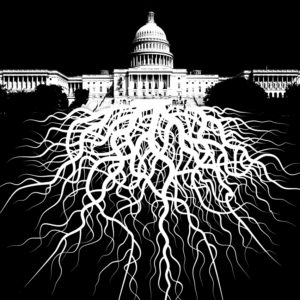In clocks that are right twice a day news, Kevin Williamson at NRO has a nice observation about the way that the expression du jour ‘deep state’ has a breadth in contemporary usage. You have the positive valence now used by those who think that Washington civil servants are part of the resistance. And you have the Sean Hannity-Rush Limbaugh version that takes the deep state to be a fifth column of bureaucrats hell-bent on undermining a legitimately elected President.
The great irony is that the term had a very different valence for liberals and libertarians only a few years ago. Waaaaay back then, ‘deep state’ or ‘deep government’ was a term of abuse for the established role that government took in civic life. Liberals thought that it was too cozy with the financial sector and with industry, and so few elections could turn back any of that. Libertarians thought it had overreached with social programs, but it was too late to repeal them.
Once the term has such breadth, only context will provide you with any clarity as to what’s being meant by its usage. Williamson makes analogy here to the term ‘neocon’ to help clarify — originally, it meant different kind of conservative, then it meant disaffected leftist-turned-conservative, and then it took on international-Jewish-conspiracy-world-war-hawk connotations. To know what mud someone’s slinging with the word, you need a little more background.
But, now, the important part with the terms ‘neocon’ or ‘deep state’ is that they not only have an evaluative and expressive role, they also play explanatory roles in what we’re seeing. And so with ‘neocon,’ the association of the neocons like Wolfowitz with the WTO was part of the sinister explanation for the Iraq War. (And so, too many people went with the last interpretation of neocon.) And with the current ‘deep state’ conspiracy theories, Hannity and Limbaugh are using it to explain the Trump administration’s early political losses.
But Occam’s Razor is ready to trim the thicket with the latter. When the own-goals are so clearly instances of incompetence, blaming a vast conspiracy of bureaucrats is really more evidence of incompetence than an alternative explanation. It’s like the suckiest kid on the team blaming the refs for every time he gets burned. Or the kid who never does the reading or the homework and then complains that your lectures don’t make any sense… and that’s why he’s failing.
Williamson makes a nice closing observation that the naming here (and how its said) works as a bit of magical thinking:
There is an ancient superstition that to name something is to assert power over it. (The members of some ancient tribes kept their real names secret and had secondary names for public use.) But giving the figments of your imagination a name and an involved back-story doesn’t make them real. It just makes you nuts.
